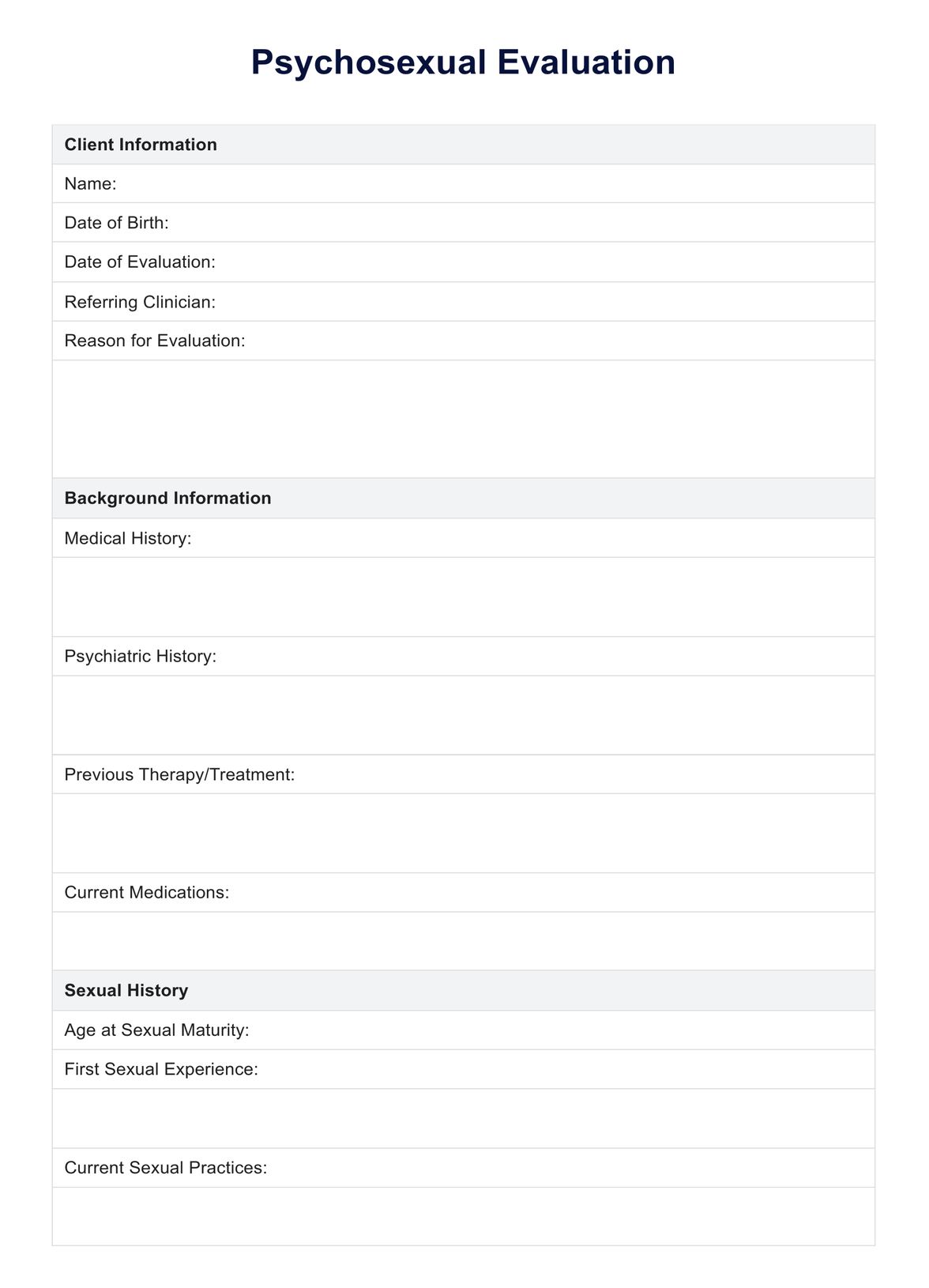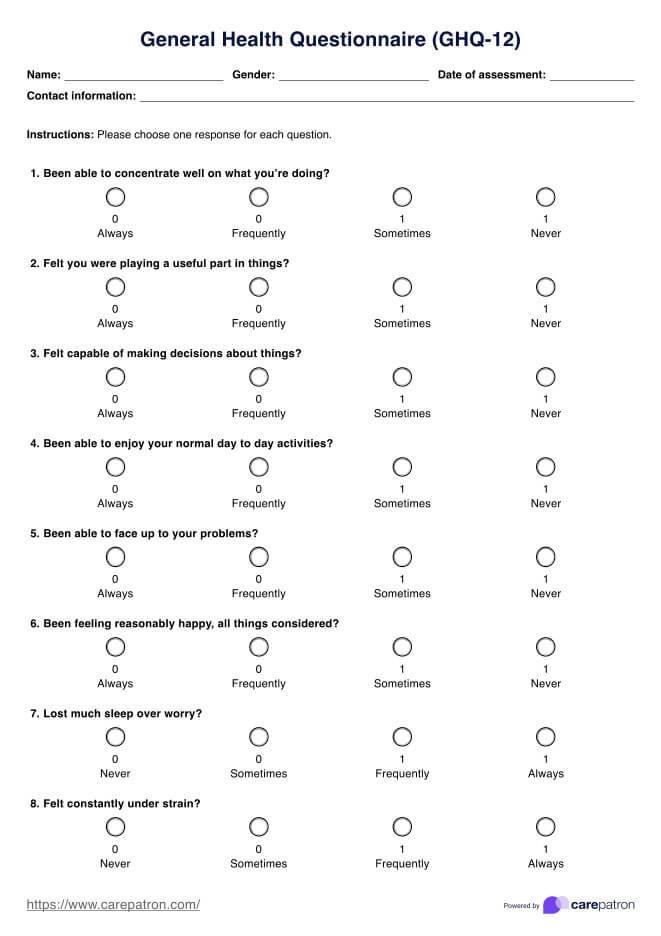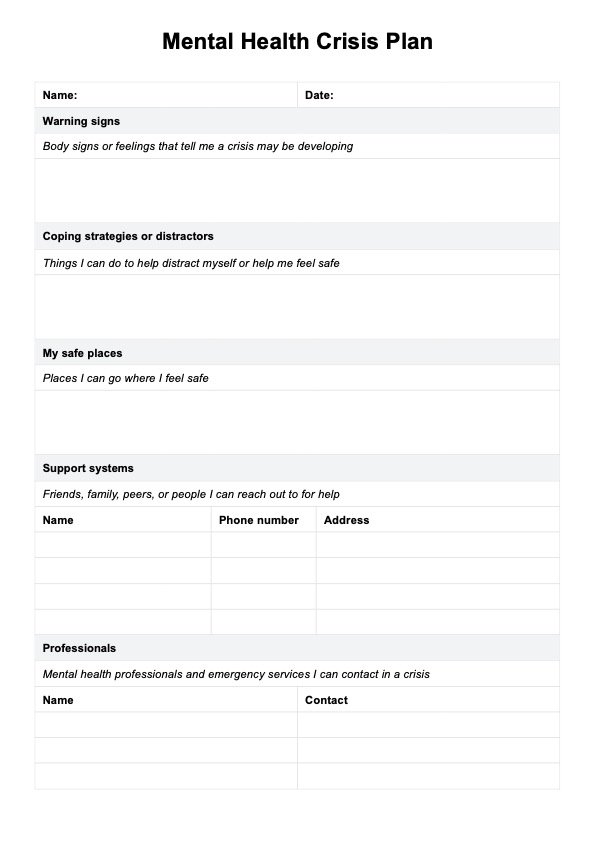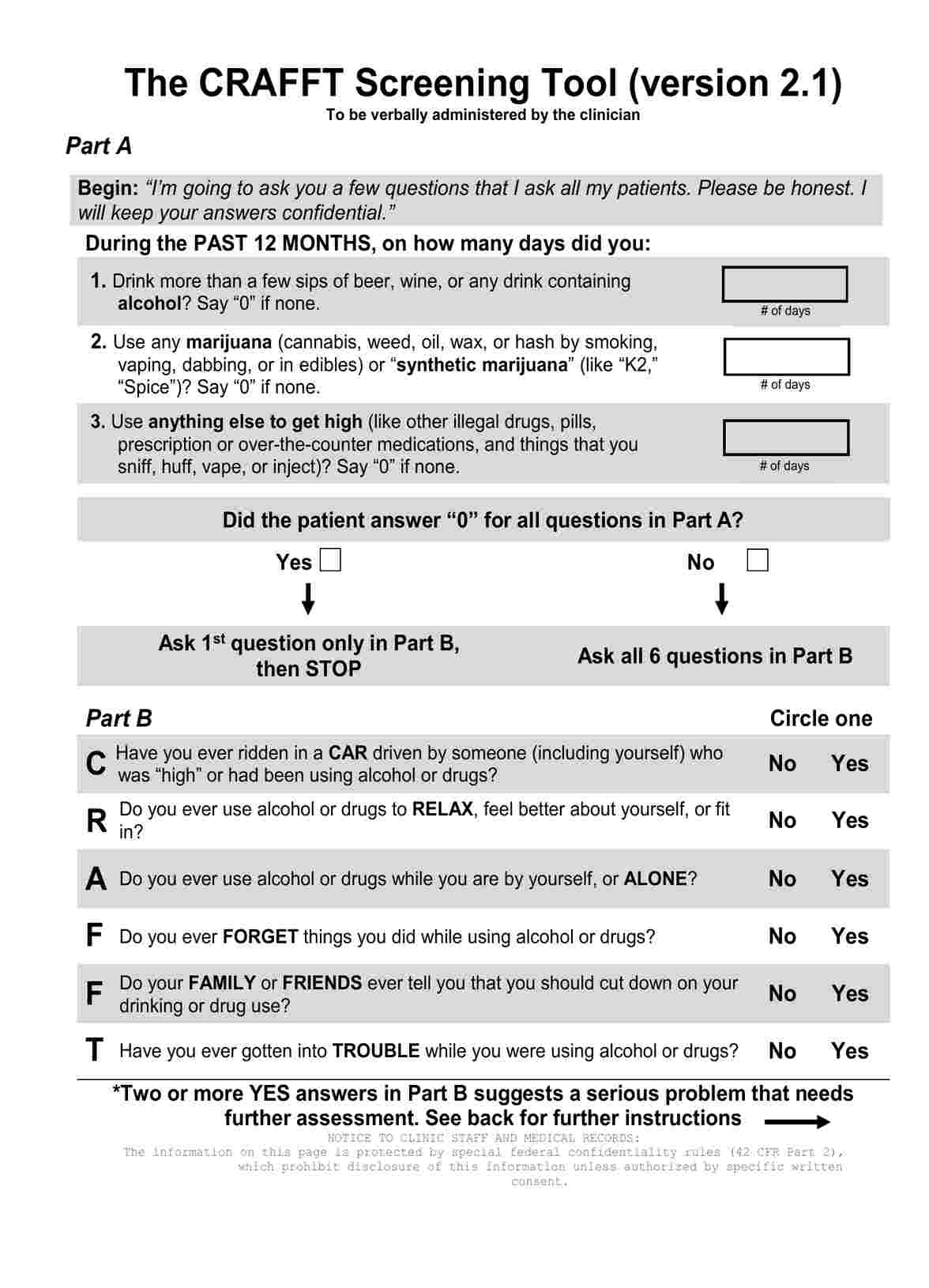Psychosexual Evaluation
Explore our Psychosexual Evaluation: A comprehensive tool for assessing sexual behaviors and risks, aiding legal decisions, treatment plans, and risk assessment.


What is psychosexual development?
Have you ever wondered how your early experiences shaped who you are today? Psychosexual development, a theory introduced by Sigmund Freud, explores this very idea. It proposes that personality development unfolds through distinct stages in childhood and adolescence, each focused on pleasure derived from different bodily areas.
This guide delves into the core concepts of psychosexual development, explaining how Freud believed our experiences – from infancy to adolescence – influence our personality and how we interact with the world. We'll also explore some criticisms of the theory and provide a free downloadable PDF for further exploration.
Psychosexual Evaluation Template
Psychosexual Evaluation Example
The five stages of psychosexual development
Sigmund Freud's theory of psychosexual development proposes a fascinating roadmap for understanding personality formation. It suggests that our personalities aren't set in stone at birth but unfold through distinct childhood and adolescence stages. Each stage is centered around a specific erogenous zone (an area of the body associated with pleasure) and how a child interacts with the world through that zone.
Here's a closer look at the five critical stages of psychosexual development:
- Oral stage (birth to 1 year): The mouth explores the world. Sucking, chewing, and tasting are all sources of pleasure for infants. Successful resolution of this stage is believed to lead to optimism and trust in the world.
- Anal stage (1 to 3 years): Potty training takes center stage! This stage focuses on gaining control over bodily functions, particularly bowel movements. Toilet training experiences influence a child's development of orderliness, patience, and a sense of autonomy.
- Phallic stage (3 to 5 years): This stage is all about self-discovery and identification with same-sex and opposite-sex parents. Children become aware of their genitals and may experience feelings of attraction towards the opposite-sex parent (Freud's Oedipus complex). Successful resolution contributes to a healthy sense of self-identity and gender roles.
- Latency stage (6 to 11 years): A period of relative calm compared to the earlier stages. Sexual urges are thought to be repressed, and children focus on developing social skills, friendships, and exploring the world around them.
- Genital stage (12 years onwards): Adolescence brings a resurgence of sexual interest and the development of a mature sexual identity. Individuals seek out intimate relationships and learn to balance their own needs with those of others.
It's important to note that Freud's theory has been widely criticized for its emphasis on sexual development and its focus on male development. However, it remains a foundational concept in psychology and offers a framework for understanding how early experiences can influence personality.
What is a Psychosexual Evaluation?
Imagine a roadmap that helps navigate the complex landscape of human sexuality. A Psychosexual Evaluation is precise – a specialized assessment conducted by mental health professionals to gain a deeper understanding of a person's sexual history, development, preferences, and behaviors. It goes beyond simply talking about sex; it delves into the intricate workings of a person's sexual world.
This evaluation uses various tools to create a comprehensive picture. In-depth interviews explore an individual's sexual history, including past experiences, current interests, and any potential concerns. Psychological tests shed light on personality traits, emotional regulation, and risk factors. Sometimes, physiological measures might even be used to assess sexual arousal patterns.
By piecing together this information, a psychosexual evaluation aims to achieve several goals:
- Understanding sexual development: It explores how an individual's sexual identity has formed throughout their life, uncovering potential influences from childhood experiences or relationships.
- Identifying atypical behaviors: The evaluation can identify any problematic sexual behaviors or paraphilias that may require intervention.
- Assessing risk: It helps evaluate the risk of future sexual offenses, which is crucial for legal proceedings and treatment planning.
Psychosexual evaluations are not one-size-fits-all. They can be tailored to address a variety of situations, from legal contexts involving allegations of serious sexual abuse or misconduct to therapeutic settings where individuals seek to understand their sexuality and improve their relationships.
When are Psychosexual Evaluations needed?
Psychosexual evaluations aren't limited to legal situations. While they often play a role in cases of alleged or confirmed sexual offenses, their applications extend beyond the courtroom. Here are some critical situations where these evaluations can be valuable:
- Legal matters: Courts rely on these evaluations to make informed decisions about sentencing, parole, and treatment plans. They provide a deeper understanding of the individual, allowing for a more just and practical approach.
- Treatment planning: Therapists use the insights gleaned from psychosexual evaluations to tailor treatment plans to specific needs. This personalized approach helps address underlying issues and reduce the risk of future problems.
- Risk assessment: One critical role of these evaluations is assessing the likelihood of future sexual offenses. This information is crucial for legal proceedings and treatment planning, ensuring appropriate interventions are in place.
- Personal growth: Even outside of legal contexts, individuals can benefit from psychosexual evaluations. They can gain a deeper understanding of their sexuality, leading to improved sexual health and more fulfilling relationships.
Whether prompted by legal concerns or a desire for self-discovery, psychosexual evaluations offer valuable insights. They provide a crucial foundation for legal decisions, effective treatment plans, and personal growth.
How professionals interpret Psychosexual Evaluations
A psychosexual evaluation isn't just a collection of data; it's a complex puzzle waiting to be pieced together. Here's how mental health professionals interpret the results of clinical interviews:
- Integration: First, they carefully integrate information from various sources: interviews, psychological tests, and physiological measures (if used). This creates a comprehensive picture of the individual's sexual history, behaviors, and potential underlying factors.
- Identifying patterns: Professionals then look for patterns and themes within the data. This might involve analyzing how past experiences influence present behaviors or identifying potential risk factors for problematic sexual behavior.
- Understanding motivations: A core aspect of interpretation involves understanding the motivations behind an individual's sexual behaviors. This can include exploring emotional needs, relationship dynamics, and any underlying mental health conditions.
- Risk assessment: In some cases, the evaluation assesses the risk of future sexual offenses. Professionals consider factors like the severity of past crimes, the presence of paraphilias, and amenability to treatment. This risk assessment is crucial for informing legal decisions and treatment plans.
- Developing a diagnosis: A mental health professional may arrive at a clinical diagnosis based on the interpreted results, if appropriate. This diagnosis can help guide treatment recommendations and inform legal proceedings.
It's important to remember that psychosexual evaluations are not black and white. Interpretations are based on a professional's expertise and experience; ongoing communication with the individual is essential. The ultimate goal is to use these insights to develop a comprehensive understanding of the individual's sexual world, which can then inform treatment plans, legal decisions, and personal growth.
How does our Psychosexual Evaluation template work?
Feeling overwhelmed by the psychosexual evaluation process? Our user-friendly template streamlines the assessment, saving you time and ensuring a comprehensive evaluation. Here's how it works in just three steps:
Step 1. Download & get started
Kick things off by downloading our downloadable Psychosexual Evaluation template. This all-in-one document guides you through a thorough evaluation, ensuring you capture all crucial aspects of your client's sexual and mental health issues.
Step 2. Fill out key sections
Once downloaded, fill out the pre-defined sections. Record client information, delve into their background and medical history, explore their psychological and sexual functioning history, and assess their presenting concerns. The template provides clear fields for observations, administering assessment tools, and conducting in-depth interviews. It's designed to capture a wide range of data, from behavior to psychosocial factors, giving you a complete picture of your client's situation.
Step 3. Secure & save the evaluation
After completing the evaluation, securely save the document following all data protection and confidentiality protocols. Ensure your client's consent is documented within the template, and finalize the assessment with your signature. Store the document securely, ensuring access is limited to authorized personnel to protect your client's privacy and maintain professional standards.
Benefits of Psychosexual Evaluations
Psychosexual evaluations aren't just about gathering information; they're a powerful tool for improving mental health and well-being. Here are some key benefits of psychological testing:
Deeper understanding of sexual behavior
These evaluations go beyond the surface of sexual functioning, revealing the "why" behind an individual's sexual preferences and behaviors. This insight helps mental health professionals understand underlying issues and develop effective treatment plans.
Identifying problematic patterns
Evaluations can uncover problematic sexual behaviors that may pose a risk to the individual or others. Early identification of sexual behavior problems allows for targeted interventions to prevent future problems.
Personalized treatment plans
Professionals can create customized treatment plans by understanding an individual's unique needs. This personalized approach leads to a treatment plan, better outcomes, and lasting change.
Improved treatment success
By focusing on the root causes of sexual dysfunction or problematic behaviors, psychosexual evaluations pave the way for more successful treatment outcomes.
Reduced risk of re-offense
These evaluations can identify risk factors for sexual offenses, allowing for interventions that promote rehabilitation and prevent future sex offenses and harm.
Overall mental well-being
Addressing sexual concerns within a broader mental health framework leads to a more holistic approach to treatment. This can improve quality of life and promote healthy sexual behavior.
Psychosexual evaluations are a valuable tool for mental health professionals, offering a deeper understanding of an individual's sexual world. This understanding translates to more effective treatment, improved well-being, and a healthier future.
Commonly asked questions
Such evaluations are typically recommended for individuals who have been involved in a sexual offense or are at risk of engaging in problematic sexual behaviors. This includes those charged with sexual crimes, individuals displaying concerning sexual behaviors, or as a part of treatment planning in therapy for sexual issues.
The results provide a detailed understanding of the individual's sexual interests, behaviors, risk factors for reoffending, and psychological health. These insights are crucial for developing targeted treatment plans, making legal decisions, and assessing the sex offender's need for supervision or restrictions.
Yes, the results are typically confidential and shared only with authorized individuals, such as the referring legal authority, the individual's lawyer, their family members, and the treatment provider. However, in legal cases, findings might be discussed in court as part of the judicial process.

.jpg)



















-template.jpg)


























































































